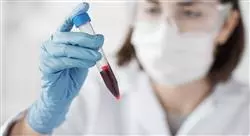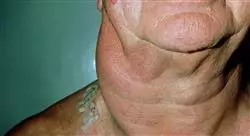University certificate
The world's largest faculty of medicine”
Description
Expand your training with us and you will see how you advance in your daily practice"
In recent decades, the most relevant advances and findings in this area have revolved around its characterization and classification, which has allowed a more specific diagnosis, follow-up and treatments, but at the epidemiological level, this has been an obstacle for the monitoring of these neoplasms and the comparison of data between different regions.
Currently, the World Health Organization (WHO) is the reference classification. It reflects a consensus among pathologists, hematologists and geneticists regarding the classification of these diseases. It was initially published in 2001 and changes or new entities were subsequently incorporated in 2008 and 2016. Even so, new relevant diagnostic and molecular pathology data are constantly coming to light that change the prognosis and management of some hematologic malignancies.
In this course program we include a review of some relevant and most prevalent lymphoid neoplasms, especially those aspects aimed at anatomopathological and molecular diagnosis. In a didactic manner, we will address the cytomorphologic differences between entities simulating neoplasms and those true tumor lesions of hematopoietic organs.
This course in Hemolymphoid Tumors, the professional will have the possibility to specialize in this subject and will allow you to develop the competences, skills and abilities for the performance of the profession, generating greater added value to your professional performance.
This online course is developed by medical professionals who have extensive experience in this pathology, and who provide students with their knowledge, experience and practical cases that give this course the quality training it deserves.
Update your knowledge through the postgraduate certificate in Hemolymphoid Tumors Blood, Bone Marrow and Lymph Nodes”
This postgraduate certificate in Hemolymphoid Tumors Blood, Bone Marrow and Lymph Nodes contains the most complete and up-to-date scientific program on the market. The most important features of the program include:
- The development of practical cases presented by experts in Skin Tumors
- The graphic, schematic, and eminently practical contents with which they are created provide scientific and practical information on the disciplines that are essential for professional practice
- News on hemolymphoid tumors
- Practical exercises where the self-assessment process can be carried out to improve learning
- Special emphasis on innovative methodologies in Skin Tumours
- Theoretical lessons, questions to the expert, debate forums on controversial topics, and individual reflection assignments
- Content that is accessible from any fixed or portable device with an Internet connection
This postgraduate certificate may be the best investment you can make in selecting a refresher program for two reasons: in addition to updating your knowledge in Hemolymphoid Tumors Blood, Bone Marrow and Lymph Nodes, you will obtain a Postgraduate Certificate from TTECH"
It includes in its teaching staff a professionals belonging to the field of genitourinary tumors who pour into this training the experience of their work, in addition to recognized specialists belonging to reference societies and prestigious universities.
The multimedia content, developed with the latest educational technology, will provide the professional with situated and contextual learning, i.e., a simulated environment that will provide an immersive training program designed to train in real situations.
This program is designed around Problem Based Learning, whereby the professional must try to solve the different professional practice situations that arise during the course. For this purpose, the professional will be assisted by an innovative interactive video system created by renowned experts in the field of Hemolymphoid tumors with extensive medical experience.
Increase your confidence in decision making by updating your knowledge through this course"
Take the opportunity to learn about the latest advances in Hemolymphoid Tumors Blood, Bone Marrow and Lymph Nodes, and improve the training of your students"
Objectives
This postgraduate certificate in Hemolymphoid Tumors Blood, Bone Marrow and Lymph Nodes is oriented to facilitate the performance of the professional dedicated to medicine with the latest advances and newest treatments in the sector.
This course will allow you to update your knowledge in Hemolymphoid Tumors. Blood, Bone Marrow and Lymph Nodes, with the use of the latest medical technology and scientific advances to contribute to the health and quality of life of patients"
General Objective
- The main goal of this training on Hemolymphoid Tumors is to update the professional's knowledge on this subject, as well as the most advanced treatments and advances that are saving the lives of women affected by this disease
Specific Objectives
- Recognize the characteristics of malignant neoplasms, their classification according a their histogenesis, as well as aspects related to their biological behavior
- Acquire up-to-date knowledge on cancer epidemiological data worldwide
- Learn about screening methods in at-risk populations to diagnose cancerous lesions early
- Recognize the environmental and occupational factors (mutagenic agents) that are directly and indirectly involved in cancer, and the carcinogenic capacity of some toxic substances found in food
- Relate DNA AND RNA viruses known to cause cancer in humans
- Expose the mechanisms by which viruses are able to subjugate the normal activity of host cytoplasmic proteins, affecting key points in the control of the cell cycle, cell growth and differentiation, causing severe alterations in cell growth and cancer development
- Recognize the role of H. pylori bacteria in the pathogenesis of gastric cancer
- Understand cancer as a genetic disease resulting from mutations that accumulate in genes that are critical for the growth and development of somatic cells
- Describe the genes associated with cancer, and the importance of DNA analysis to identify individuals, detect predisposing gene polymorphisms, analyze mutations, and establish the diagnosis of cancer as a genetic disease
- Recognize the susceptibility genes involved in breast, lung, thyroid, colon, skin, bone, pancreatic, and neuroblastoma cancers, and by what mechanism they participate in tumorigenesis
- Know the symptoms and signs that are most frequently related to cancer, as well as the different systems for the staging of tumor disease and their importance
- Know the phases of the cell cycle, the critical control points, as well as the genes involved in its regulation
- Recognize the important role of cell cycle checkpoints and DNA repair systems in maintaining the fidelity and integrity of genome replication and repair, and regulating cell cycle dynamics
Explain the positive and negative feedback regulatory processes that contribute to cell cycle progression, and the significance of negative controls on cell cycle progression that are present during development, differentiation, senescence, and cell death, which play an important role in preventing tumorigenesis - Identify the difference in gene expression between normal tissue and tumor tissue
- Know the stages involved in the transformation of a normal cell to a malignant cell
- Recognize the malignant phenotype as the result of a characteristic pattern of gene expression, alterations in the function of the human genome, which cause erratic growth, dedifferentiation, invasion, and metastasis
- Characterize the different genes involved in cell cycle regulation (growth-promoting genes, growth-inhibiting genes, genes that regulate apoptosis and genes that repair damaged DNA), and the mutations that alter them
- Explain the key role that oncogenes may play in the development of cancer by directing mechanisms that lead to the development of neoplasms
- Know tumor suppressor genes as cytoplasmic components capable of reversing the tumor phenotype; proteins that control the cell cycle, proliferation, and differentiation
- Identify epigenetic aberrations (DNA methylation with silencing of gene expression, and histone modifications that can enhance or dampen expression), which contribute to the malignant properties of cells
- Recognize the role of epigenetic changes in malignant phenotype, including gene expression, control of differentiation, and sensitivity and resistance to anticancer therapy
- Know the genes and proteins associated with malignant diseases and their utility as tumor markers to define a particular entity, its diagnosis, staging, prognosis, and screening in the population
- Know and apply the different technologies used to analyze the gene expression profile of neoplasms to identify clinical and biological aspects that are difficult to determine by histopathological examination. Its principles, advantages, and disadvantages
- Explain the importance of gene expression profiling for the application of different treatment protocols and the response to them among histologically similar tumors
- Recognize the importance of gene expression profiling in the new classifications of malignant tumors associated with prognosis and response to treatment
- Gain more in-depth knowledge of the different types of systemic lymphomas and mature B and T neoplasms
- Address the difficulties in the histopathological diagnosis of Hodgkins lymphoma
- Learn about the morphological and molecular differences between benign and malignant lesions of the hemato-lymphoid system
A unique, key and decisive training experience to boost your professional development"
Postgraduate Certificate in Hemolymphoid Tumors. Blood, Bone Marrow and Lymph Nodes. If you are looking for an opportunity to study online and deepen your knowledge in hematologic medicine, the Postgraduate Certificate in Hemolymphoid Tumors offered by TECH is an excellent option for you! This program, offered by our School of Medicine, focuses on the study of tumors affecting the blood, bone marrow and lymph nodes. Participants will have the opportunity to learn about the different types of hemolymphoid tumors, their pathology, diagnosis and treatment, as well as new trends in research and treatment of these diseases. This program is perfect for health professionals who wish to broaden their knowledge in the area of oncology and hemato-oncology. In addition, the online modality allows you to study from anywhere and at any time, making it more accessible for those who have a busy schedule. The professors who teach the lessons are experts in the field of oncology and hemato-oncology, and are committed to providing quality education. The course content is designed to cover all relevant aspects of hemolymphoid tumors, from anatomy and physiology to interventional processes.
Learn online about hematologic tumors
At the end of the course, students will be able to identify the different types of hemolymphoid tumors and understand the available treatments. In addition, they will have a deeper understanding of trends and developments in research and clinical approaches. Therefore, if you are interested in oncology and hemato-oncology, and want to deepen your knowledge in the area of hemolymphoid tumors, the Postgraduate Certificate offered by TECH is the best option. With the ease of online study and the support of experts in the field, this academic offer gives you the opportunity to grow professionally and improve the quality of care for your patients. Do not wait any longer to enroll!











